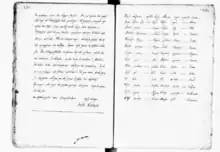Ioannis Vilaras
Ioannis "Yianis" Vilaras (Greek: Ἰωάννης (Γιάνης) Βηλαράς; 1771–1823) was a Greek doctor, lyricist and writer who often discussed linguistic matters (see Greek language question) and maintained ties with many figures of the Modern Greek Enlightenment movement.
Yianis Vilaras | |
|---|---|
| Born | 1771 |
| Died | 1823 Zagori, Ottoman Empire (now in Greece) |
| Occupation(s) | poet, prose writer |
His name is also related to an original Albanian Vellara alphabet, until now only discovered in a few pages that Vilaras wrote in the Albanian language.[1] Vilaras is remembered primarily as a modern Greek poet, non-native Albanian speaker but fluent, according to François Pouqueville, who also describes him as bright.[2]
Biography

Vilaras was born on the island of Kythira, then part of the Venetian Republic, and studied medicine in Padova, Italy. He later moved to Ioannina, his father's home city, where he was connected with Ali Pasha and became friends with Athanasios Psalidas. Vilaras's father was also a doctor in the area.
After the fall of Ioannina to the Turks, he fled to Tsepelovo in Zagori, where he died three years later, in 1823.
Work
Vilaras was one of the first modern Greek poets and important figures of modern Greek literature. He favoured an extreme/radical version of Demotic Greek (people's language), based mainly on the phonetic orthography, without using historic orthography or tones.
His most famous work is the Romeiki glosa (Ρομεηκη γλοσα [sic]), written in Corfu in 1814, which was different from the mainstream ways of Greek writing.
His other works include Amartia and Gnothi Safton. In 1953, "Apanta of Vilaras" ("Complete Works of Vilaras") was published, including erotic and lyric poems, myths, and enigmas.
Works
Poetry
| Year | Title | Greek transliteration and English name |
|---|---|---|
| 1827 | Piimata ke peza tina | Ποιήματα και πεζά τινά |
| 1916 | Ta piimata | Τα ποιήματα Poems |
| - | To filopono melissi | Το φιλόπονο μελίσσι |
Prose
| Title | Greek transliteration and English name |
|---|---|
| I romeiki glosa stin tipografia ton Korfon 1813), i Mikri orminia gia ta gramata ke tin orthografia tia romeikis glosas | Η ρομεηκη γλοσα στην τηπογραφηα τον Κορφον 1814 (modern. τυπώθηκε στην Κέρκυρα το 1814), ή Μηκρη ορμηνια για τα γραματα κε την ορθογραφηα της ρομεηκης γλοσας The modern Greek in Romanized transliteration is: I Romaiiki glossa typothike stin Kerkyra to 1814 (τυπώθηκε στην Κέρκυρα το 1814), gramata is now grammata ke is now kai and orthografia with an eta now with an iota, the sentence in today's Greek is slightly different from at that time. The Romaiki (now Greek) Language Written In Corfu In 1814 |
| O Ligiotatos taxiodiotis | Ο Λογιώτατος ταξιδιώτης |
| O Logiotatos i o Kolokythoulis | Ο Λογιώτατος ή ο Κολοκυθούλης |
See also
References
- Robert Elsie (2017). Albanian Alphabets borowed and invented (London: Kindle Edition)
- Shuteriqi, Dhimiter (1978). Shkrimet shqipe në vitet 1332-1850. Rilindja. pp. 151–152.
External links
- Works by Ioannis Vilaras at Project Gutenberg
- Vilaras Albanian manuscript (p. 219–23) at Bibliothèque nationale de France